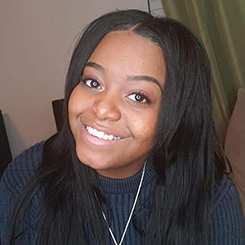
UNC student and advocate, Alexis McCowan, shares her experience with mental health and resources for support.
My name is Alexis McCowan. My pronouns are she, her, and hers. And I'm your Public Relations and Relations Fundraising Coordinator for the Residence Hall Association, the Director of Campus Relations for your Student Senate as well as part of Fan and Marketing Experience for UNC Athletics.
Let's go into the history into our topic today and I just kind of want the platform for you.
Awesome. So, mental illness has become more of a mainstay in my life than I thought it was going to before I came to college. I had worked with leadership groups throughout my home city of Colorado Springs. And I had seen some effects within my high school, James Irwin Charter High school, Go Jaguars. And I decided that I wanted to make a change. At that time, Colorado Springs was the epicenter of teen suicide within our county of El Paso County. And we are actually the highest state for teen suicide. So that's what kills most teens in Colorado. It's not drunk driving. It's actually suicide.
Is there any particular reason why such a high amount in one area?
What we have discerned from that is a lack of investment within youth in Colorado and that's all around not only within, like resources for mental illness or mental health awareness, but also within like the state of education and how we're funding higher education and schools. So it's just kind of across the board. I feel as though that the state has kind of dropped some balls when it comes to preparing and funding those areas before they got out of hand.
Were these patterns going on when you were in high school?
Yes.
Okay. So some of that, I'm assuming was a catalyst for why you got into this realm?
Yes, absolutely. Not necessarily at my high school, but, I'm sure anyone that's aware of the area, Discovery Canyon, that's a school that had up to, I think it was 12 suicides in one year. So, it was taking effect to not only at small high schools, like my charter school, which only had 400 folks, but bigger high schools as well.
What sort of advocacy or planning did you have back then that has still continued on or any sort of legacy?
I was able to get in contact with the National Alliance on Mental Illness, NAMI, and they were able to connect me with some folks including the Colorado Crisis Services, and we devised a plan to create a campaign geared towards teens from teens about mental illness. And this was the first time that they had created a program from teens to teens, which is what we assume a lot of this success is coming from, is the verbiage and the language that teens, and I was 15 at the time, that we had created in those messagings and that content to put out. And that's why it's been a little more successful than other attempts in the past.
Yeah. It has that peer education piece. What sort of examples did you bring?
Yes, of course. So, the campaign is known as Below The Surface. Something that we really wanted to highlight was that students, as they go throughout their education journey, are going to be met with a lot of expectations and pressures. So a couple of the things that we had prepared was, "My parents care about all the wrong things." So you have like this bright, kind of happy look on things, but then when you look below the surface, it really reveals kind of the stress and the pressure that our teens are using today. The signage that I felt was, "I'm happy that people think I'm okay." And, that was a mantra that I had kind of carried a lot throughout high school. And it wasn't until I came to UNC that I went to the counseling center and received an official diagnosis and was able to create a plan for my own mental illness.
I'm going to go back to teenagers, but then like also transfer it to here. So maybe it's a two part question. What contributes to the mental health in, should I say illness? Is that the, I want to know the proper term.
Yeah, absolutely. Everyone has mental health. Everyone should take care of mental health. It's just like exercising. Everyone has a body. Some people's bodies are just a little different than others. And that's where we get to that point of taking care of your mental illness if that's what you have. But everyone should be maintaining their health and that's extremely important.
So what is, what is usually common amongst, I want to say youth? Should I say youth? Emerging Adults?
Yea, so youth for us is between the ages of 12 to 20, so that's kind of the 'youth frame' that we like to use. Youth today do not grow up the same as our parents. So my parents are 41. My parents did not grow up the same way that I'm currently growing up. The distractions, the expectations, the influence of social media. We're the second generation of school shootings. You know, that's something that I fear. I can't walk into a movie theater without thinking about it and just that social awareness. The pressures that this high stakes, high speed day and age puts on us constantly, 24 hours a day I think has taken a large effect. So we're seeing large cases of depression and anxiety and personality disorders. Just a lot of different types of avenues where I believe that parents necessarily may not understand it because it's not the same as it was for them.
Right. I like how you said, like the, the constant, awareness and that pressure that always comes with it. How do our parents relate to the idea of having social pressure at school when you have something like, cyber bullying, right? Like, like something that, that's online that you don't actually physically see other than what's on a screen. And that's always there. Then the need of always being able to record. It's a rather constant, scary process.
It's horrifying. And, and I am so glad that you brought up cyber bullying because that is a giant contributor and a great example. Another reason why we tried to implement this process in the way that we did.
In our parents day and age, you go to school, there's a bully, alright....maybe they rough you up a little bit physically, and then when it's three o'clock and it's time to go home, the bullying stops. But for a lot of our youth and our teens, they're experiencing constant bullying and to a wide array of apps and, it's not just email anymore. You have Snapchat, Tick Tock, Facebook, Instagram, Twitter. You know, you could have a rumor spread about you throughout the entire school in less than minutes.
Digital wildfire.
Yeah, exactly. And it's like, the internet is forever. And once your image or your name or anything is linked to that type of destructive imagery or destructive verbiage, it stays with you. And it's not something that ends when the bell rings at 3:00 PM.
Right. Once you're a meme, you're always a meme.
Yes.
So what is Below the Surface doing now to help combat, should I say combat?
Oh yeah, absolutely.
Combat mental illness and in help mental health. Yeah. So below the surface has been working in schools. For its pilot year, it started in Colorado Springs where we saw the most concentrated amount of suicides and we have been able to kind of expand from there. So our campaign results, for the first 12 months, we were kind of doing like a statewide campaign between October, 2018 and October, 2019. And we experienced an increase of 236% more texts from Colorado youth between the ages of 13 and 17. And now youth is the 26th percentile of those that texts us, which is up from the last year of 19%. So, the Colorado crisis services does serve more than just teens, but the Below The Surface portion of it did just focus on folks that were feeling, that they needed academic support, social support from pressures, bullying, harassment, depression, anxiety, family instability, and substance abuse.
We do hear a lot of calls from those identify as LGBTQ+, and folks that have fear within relationships. So a lot of folks utilize this service in order to just get more assistance than what would be under the umbrella of what's socially conceived as mental illness.
I have borderline personality disorder, which sounds like I'm Hannibal Lecter and I should like have a mask or something. It's really scary. It's a scary name, but I'm, I'm just like anybody else. And I think that when we try to deconstruct what we socially see as mental illness, we always get ideas of people that are deranged in our heads. But in reality, it's just everyday people that just need assistance or support in getting through their everyday lives. And what Below the Surface does, is it allows the person who's texting through the service to say, I am in crisis. Whether that be I failed a math test and my parents are going to be so mad. Or I'm really scared because I don't feel like I have control over my body or myself or my mind. And it allows that person to take that power back and utilize the resources that are out there in order to get some support.
Some things that people may, if they use the crisis line because it is a free service but it is also through the state of Colorado. So I don't want folks to be like, 'Oh well my parents find out like how does that work?' So, when texting the crisis line, you text talk to 38255, and you'll be asked your name, your date of birth, zip code and your gender identity. The information that you provide is completely confidential and it helps the crisis counselor that'll be assisting you to provide the most appropriate resources for the situation.
It's up to you for as much info as you want to share. The crisis counselor will still provide the best care and support even without all that info. After gathering basic info, the crisis counselor will ask you what's going on and how they can help you when texting the crisis helpline, teens, we want you to be able to feel as though you're in a safe space, that you can discuss any of your concerns, feel less alone and feel as though you're being taken seriously without fear of getting in trouble. We'll be able to give you more information about warning signs and risk factors and also coping strategies.
A lot of folks like to ask us, will police get involved If I decide to text the line? It's a very rare occurrence that we will contact the police. But it does happen in very extreme situations. We just want to make sure that the person at the other end of that phone receives as much support and assistance as they deserve.
If you want to learn more, please visit www.belowthesurfaceco.com to learn more Colorado crisis services and to share this resource with your friends.
I want students on UNCs campus to feel heard when it comes into regards of mental illness and mental health awareness. I think that in the past, our university has done a disjustice to the students here. There should never be an occurrence where you are notified of a suicide within a residence hall after the announcement of the Pie Cafe in an email. That should never occur. No students should ever feel less than in that way and no bear should ever feel as though that they are left without a pack.
The reason that I wanted to share this or I guess why it's so important to me to give other resources, is because we all need support and we all need assistance and sometimes we're too scared to utilize the resources that we have readily available. But this is a resource that's in your pocket 24 hours a day, 365, that I believe could get you in between those long wait times at the counseling center, or could just be a grounding method to just keep you here a second longer.
Music:
Broke For Free - Love Is Not
Podington Bear - Wellness





